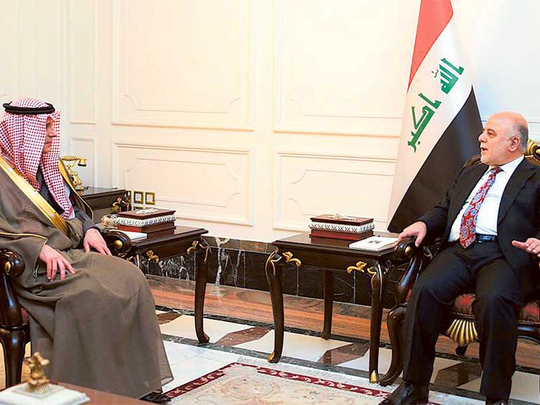
Dubai: Saudi Foreign Minister Adel Al Jubair’s rare visit to Baghdad on Saturday was meant to dismiss Iranian claims that Saudi Arabia has shunned Iraq, political analysts speaking to Gulf News have said.
Al Jubeir’s visit, which is also the first by a Saudi foreign minister since 1990, also reflects a shift in Saudi foreign policy in the past months, they added.
“Iraq is one of the main countries in the regional Arab bloc,” Mohammad Ezz Al Arab, an expert on Arab and foreign relations at the Cairo-based Al Ahram Strategic Studies Centre, told Gulf News.
Observers believe international developments could have prompted rapprochement between Riyadh and Baghdad.
“In the past, Iran was flexing its muscles on the region,” said Abdul Aziz Al Saqr, Chairman of the Jeddah-based Gulf Research Centre. But today, “there is a new US president who wants to limit the Iranian influence.”
“Iraq is an important neighbouring country. We have historical relations with it,” said Al Saqr.
Al Jubeir’s visit aimed “to reinstate the importance of the bilateral Saudi-Iraqi relations,” Saqr told Gulf News.
But, if Baghdad is interested in having good relations with its southern neighbour, it should distance itself from sectarianism; and have a foreign policy independent of Iranian politics, the Saudi political analyst said.
“Saudi Arabia, which does not differentiate between Iraq’s Sunnis, Shiites and Kurds, would like to see an Iraq with a strong Arab identity,” Al Saqr added.
“Saudi Arabia doesn’t want to leave any room for Iran to play with Iraq as it wishes,” said Ezz Al Arab, “Saudis want to have relations not only with the Sunni leaders in Iraq, but also with the ruling coalition,” he added.
Relations between Saudi Arabia and Iraq sharply deteriorated after Saddam Hussain’s invasion of Kuwait in August 1990. At the time, Saudi Arabia-based US-led coalition forces launched attacks on Iraqi forces to liberate Kuwait. However, after the US war on Iraq in 2003 and the removal of Saddam’s regime, Iran extended its influence in Iraq due to the resulting power vacuum.
Several Arab countries accuse Iran of regional meddling.
Saudi Arabia, analysts say, also wants to thwart attempts by Iran to incite Shiite uprisings in Bahrain and Saudi Arabia.
Saturday’s visit also reflects what analysts described as Saudi Arabia’s attempts to rebuild relations with Arab countries.
In January, Saudi Arabia and Lebanon began efforts to mend relations, after Lebanese Foreign Minister Jibran Bassil refused to condemn attacks on Saudi missions in Iran in January 2016.
Hezbollah, a Lebanese militant group backed by Iran, is part of the Lebanese government and holds significant sway.
Riyadh, angered by the move, decided to cut military aid to Lebanon and curb travel of GCC nationals to Lebanon, hurting the tiny Mediterranean country’s economy which heavily relies on tourism.
“First, Saudi Arabia moved to mend fences with Lebanon and now it is doing the same with Iraq,” Ezz Al Arab said.
“I don’t think this visit will end all tensions, but it will pave the way for more actions in the future,” he added, giving examples of Saudi investments in Iraq and Saudi participation in rebuilding efforts in Iraq, especially those areas wiped out in the war against Daesh in Iraq.
Saudi efforts come on the heels of similar Egyptian and Turkish efforts to mend fences with Iraq.











